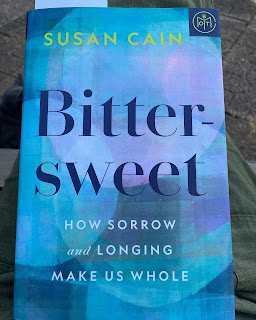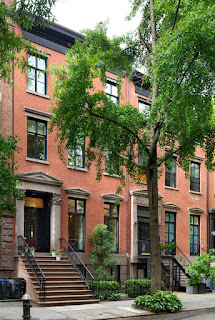In Bittersweet, readers are introduced to Min, an extraordinarily gifted violin protege.
She took out a second mortgage on her apartment to buy the instrument that became the Great Love of her life. In what I cannot fully comprehend, it was apparently the only one in the world that really fit her. (Harry Potter? Wands? Anyone?)
Then it was stolen and sold somewhere in the art underworld. Min went into a deep depression that lasted for years. When she finally emerged, it was to write a memoir.
"The moment my violin was stolen, something in me died... I thought for a very long time that it would recover. But it never did. I have to accept that the person I was...with the violin is gone."
Author Susan Cain (Min’s friend) goes on to ask us: What are you separated from? What or whom have you lost?
Loss is the one great certainty of life.
One of the petals of yoga is the yamas, or code of conduct for restraint (how NOT to be) in the world.
Perhaps what I am most attached to is my belief about how Life “should” look: find a partner, get some foster kids, edit books for a living.
Failing that, Life is supposed to look like this: be single and fabulous, teach high school English, spend the summers traveling and writing, eventually find a partner sometime in my middle age, a la Elizabeth Gilbert.
None of that happened quite as I intended. Instead, I am a single woman with 2+ jobs teaching middle schoolers how to be functional human beings who do not intentionally flood the bathroom in the 500 wing every other week.
For me, the tension of aparigraha is in figuring out how to let go of the desire for what I wanted life to be and at the same time continuing to stretch out my hand, to work for more. There it is - that fine balance again.
I want to not be where I am. I literally cannot fathom teaching Fort Zumwalt's scripted 8th-grade curriculum for the next 12 years until I retire.
I want to keep changing and challenging myself, but I have applied for and been rejected from 17 other teaching positions in the last two months, some within my own district.
What does it look like to un-attach from my idea of how life *should* look so that I can make peace with where I am? How do I hold the tension between where I am and the yearning for something more? And as importantly, how do I let go of what I think I want or need so that I am open to whatever the Universe might have in store?
***
When it comes to attachment, I think one of my strongest attachments is also to the idea that I’m a teacher. I don’t remember the moment I first realized I was a grown woman. But I remember after 5 years with 8th graders, realizing that I was now a Teacher. It was a magical moment.
Now, I don’t know. Teaching seems to have lost a lot of its luster. I’m snappish and jaded in a way I wasn’t before. One of the principals with whom I interviewed said, “Hats off to you middle school teachers. We didn’t realize quite how much socialization you were responsible for until this freshman class arrived, having stayed at home the final year of middle school. They are INSANE. We can’t even teach them the content because we’re so busy putting out fires with classroom management that you guys normally handle in middle school.”
On one hand, that was nice to hear and made me think, maybe the problem is not me, it’s the pandemic-crazed buckets of hormones sitting in my classroom right now.
But on the other hand, did that Fort Zumwalt principal offer me a job teaching freshman English in her building? No. No, she did not. Because my teaching experience is “only middle school.”
In Bittersweet, Susan Cain talks about her time as an attorney. She had been working 16-hour days for seven years in order to make partner at her firm. In her mind, partner at a law firm meant this beautiful red-brick townhouse in Greenwich Village where she’d once been invited by a law partner. She wanted that townhouse or one of its neighbors, the ones with the scripted plaques denoting what famous writer or singer or poet had once lived in that very spot.
And then one day she was informed that she hadn’t made partner. All those 16-hour days, up in smoke. So she quit.
It turned out that what she really wanted was a sense of belonging and home, and to be one of the writers who’d lived in the Greenwich Village townhouses. So she started writing.
“I’d misinterpreted the signpost,” writes Cain, who then went on to write the NYT Bestseller, Quiet.
***
If I’m honest, what I'm most attached to - more so even than teaching - is the desire to live a meaningful life. If I could go back and redo everything, maybe I’d join the Peace Corps or major in something completely different and work for the UN.
In Bittersweet, Cain highlights the importance of taking your area of pain and sorrow and making that your creative offering to the world.
She talks about the old tale of Franz Kafka meeting a distraught little girl in the park one day. She'd just lost her precious doll, and after looking high and low, was disconsolate about its loss. Kafka started writing letters from the doll to the girl, telling the little girl all about the amazing places "she" (the doll) was visiting. This went on for a very long time, until one day Kafka presented the girl with a new doll, obviously a different one. "My travels have changed me," read the final note.
The love, the meaning, the purpose we had and lost will come back to us eventually, but it will never be in the same form. Like Min's violin or Kafka's doll or Cain's townhouse, we have to train ourselves to recognize the love and bounty afforded us, even if it looks different than we thought it would.
Aparigraha asks us to un-attach from the things we think we *need* - relationships, job titles, a certain home in a certain place. It is a challenge, at least for me, a person who romanticizes the past. Nonetheless, I'd like to try being open to whatever it is the Universe might have in store. After all, being a high school English teacher is not the only meaningful thing...







No comments:
Post a Comment